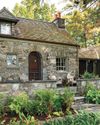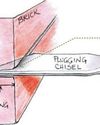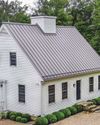
PROBLEM 1: Door binds evenly along latch side and head.
PAINT BUILDUP Remove excess paint with heat or chemical removers. If the paint flakes off, simply pull a sharp paint scraper along the length of the mating surfaces. Be careful not to gouge or otherwise damage the door or jamb, especially if you intend to strip and refinish.
SEASONAL EXPANSION This causes the door to swell during humid periods, making it difficult or impossible to close. Plane the door during the peak of the humid season.
PROBLEM 2: Door binds on latch side of head with a gap at floor.
The top rail of a door is usually narrower than the bottom and more a focal point. Planing it to follow the slope of the head may leave it unsightly and distorted.
If you have to remove a lot of material, you could even expose the tenon, weaking the door. Instead, follow the procedure for a door with a gap at the top (3). You may have to reframe the door.
PROBLEM 3: Door drags on floor with gap on latch side of head.
BUILDING SETTLEMENT is most often the cause of a dragging door. A gap between the door and the head differentiates this problem from a simple loose hinge as the cause. Check the squareness of the door opening by putting a level on the head and along both sides of the jamb. An old building usually settles downward with only secondary lateral movement (leaning); usually the head is furthest out of alignment.
This story is from the {{IssueName}} edition of {{MagazineName}}.
Start your 7-day Magzter GOLD free trial to access thousands of curated premium stories, and 9,000+ magazines and newspapers.
Already a subscriber ? Sign In
This story is from the {{IssueName}} edition of {{MagazineName}}.
Start your 7-day Magzter GOLD free trial to access thousands of curated premium stories, and 9,000+ magazines and newspapers.
Already a subscriber? Sign In

faded luxe IN A RETURN TO SAVANNAH
Residents of the Blue Ridge Mountains find their city home in a converted commercial building in beautiful Savannah, Georgia.

a hudson valley VERNACULAR
When Harlan Bratcher started looking for a country house in New York, in 1990, he knew what he wanted-something peaceful and serene, an escape from the hectic lifestyle of Manhattan.

the Dr. Mills house RESTORED
In rural Washington State, a dedicated couple bring back a 1912 bungalow that once had been the town's hospital.

The Right Masonry Tool for Repointing
The mortar between individual bricks or stones begins to erode after many years. That might be attributed to rain and wind, leaky gutters, building settlement, or such chemical agents as de-icing salts.

How To Remove Wallpaper
There's more than one way to do it; try them all until you find what works for your situation.

living with PLASTICS anxiety
Plastics are ubiquitous in modern life. Even houses built long before vinyl caught on are now full of polymer-based products, from the hoses in pull-down faucets to plastic light switches. Now that we know exposure to certain plastics can be hazardous to human health, we need guidance on how to evaluate building products for potential impacts.

homey Craftsman Textiles today
For bungalows, Craftsman houses, and Tudors that might have rather severe woodwork and furniture, textiles are a critical part of the decorative scheme.

Navigating the Lumberyard - Here's some lumber lingo you should know before you venture into a lumberyard.
Here's some lumber lingo you should know before you venture into a lumberyard. Almost everyone fixing an old house will end up at a lumberyard-whether it's a local supplier or the organized aisles of a big-box home-improvement store.

a farmhouse renewed
Sensitive renovations and restoration work preserved a house that dates to 1799.

AN OVERVIEW OF METAL ROOFING
METAL ROOFS ARE RESURGENT, FOR GOOD REASONS.